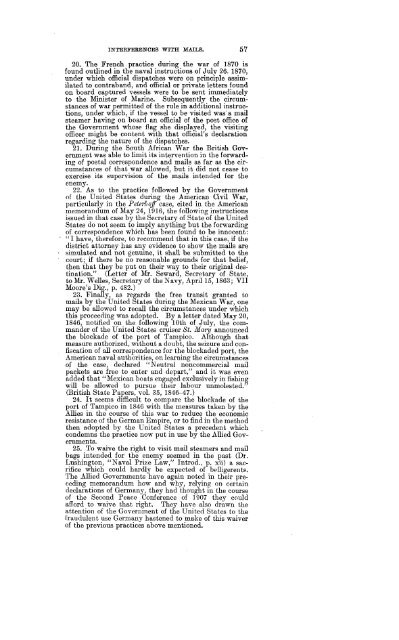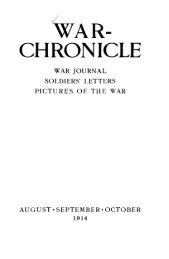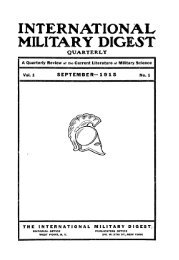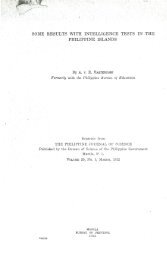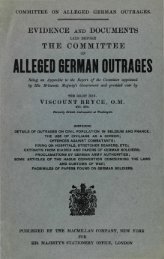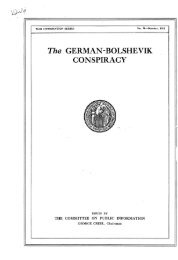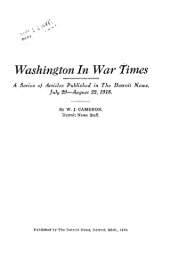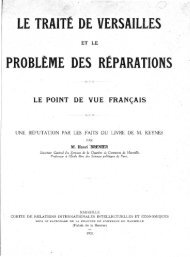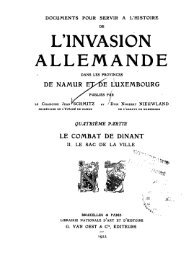DEPARTMENT OF STATE.
DEPARTMENT OF STATE.
DEPARTMENT OF STATE.
You also want an ePaper? Increase the reach of your titles
YUMPU automatically turns print PDFs into web optimized ePapers that Google loves.
INTERFEBENCES WITH MAILS. 57<br />
20. The French practice during the war of 1870 is<br />
found outlined in the naval instructions of July 26. 1870,<br />
under which official dispatches were on principle assimilated<br />
to contraband, and official or private letters found<br />
on board captured vessels were to be sent immediately<br />
to the Minister of Marine. Subsequently the circumstances<br />
of war permitted of the rule in additional instructions,<br />
under which, if the vessel to be visited was'a mail<br />
steamer having on board an official of the post office of<br />
the Government whose flag she displayed, the visiting<br />
officer might be content with that official's declaration<br />
regarding the nature of the dispatches.<br />
21. During the South African War the British Government<br />
was able to limit its intervention in the forwarding<br />
of postal correspondence and mails as far as the circumstances<br />
of that war allowed, but it did not cease to<br />
exercise its supervision of the mails intended for the<br />
enemy.<br />
22. As to the practice followed by the Government<br />
of the United States during the American Civil War,<br />
particularly in the Peterhqff case, cited in the American<br />
memorandum of May 24, 1916, the following instructions<br />
issued in that case by the Secretary of State of the United<br />
States do not seem to imply anything but the forwarding<br />
of correspondence which has been found to be innocent:<br />
"I have, therefore, to recommend that in this case, if the<br />
district attorney has any evidence to show the mails are<br />
simulated and not genuine, it shall be submitted to the<br />
court; if there be no reasonable grounds for that belief,<br />
then that they be put on their way to their original destination."<br />
(Letter of Mr. Seward, Secretary of State,<br />
to Mr. Welles, Secretary of the Navy, April 15, 1863; VII<br />
Moore's Dig., p. 482.)<br />
23. Finally, as regards the free transit granted to<br />
mails by the United States during the Mexican War, one<br />
may be allowed to recall the circumstances under which<br />
this proceeding was adopted. By a letter dated May 20,<br />
1846, notified on the following 10th of July, the commander<br />
of the United States cruiser St. Mary announced<br />
the blockade of the port of Tampico. Although that<br />
measure authorized, without a doubt, the seizure and confiscation<br />
of all correspondence for the blockaded port, the<br />
American naval authorities, on learning the circumstances<br />
of the case, declared "Neutral noncommercial mail<br />
packets are free to enter and depart," and it was even<br />
added that "Mexican boats engaged exclusively in fishing<br />
will be allowed to pursue their labour unmolested.<br />
(British State Papers, vol. 35, 1846-47.)<br />
24. It seems difficult to compare the blockade of the<br />
port of Tampico in 1846 with the measures taken by the<br />
Allies in the course of this war to reduce the economic<br />
resistance of the German Empire, or to find in the method<br />
then adopted by the United States a precedent which<br />
condemns the practice now put in use by the Allied Governments.<br />
25. To waive the right to visit mail steamers and mail<br />
bags intended for the enemy seemed in the past (Dr.<br />
Lushington, "Naval Prize Law," Introd., p. xii) a sacrifice<br />
which could hardly be expected of belligerents.<br />
The Allied Governments have again noted in their preceding<br />
memorandum how and why, relying on certain<br />
declarations of Germany, they had thought in the course<br />
of the Second Peace Conference of 1907 they could<br />
afford to waive that right. They have also drawn the<br />
attention of the Government of the United States to the<br />
fraudulent use Germany hastened to make of this waiver<br />
of the previous practices above mentioned.


